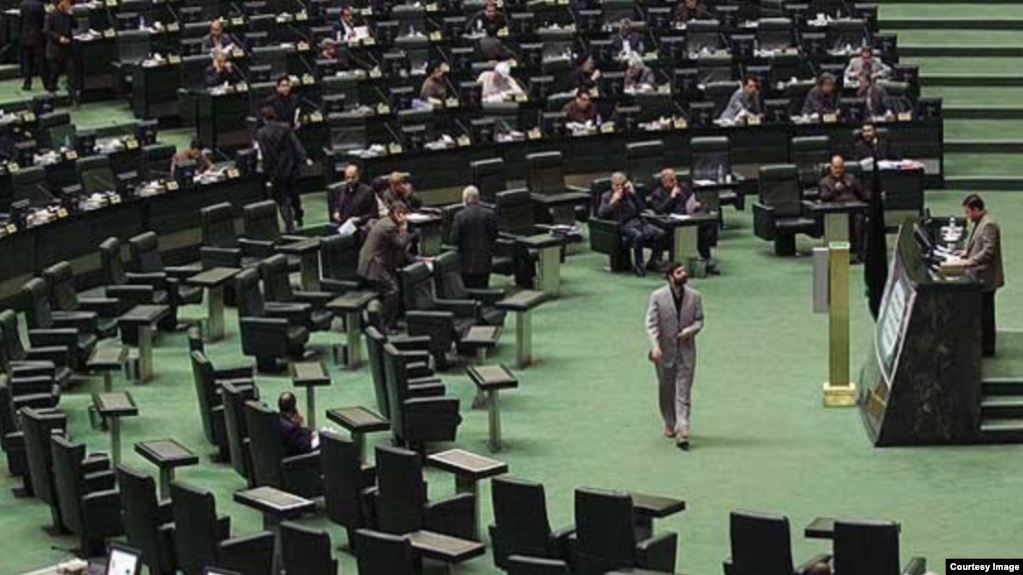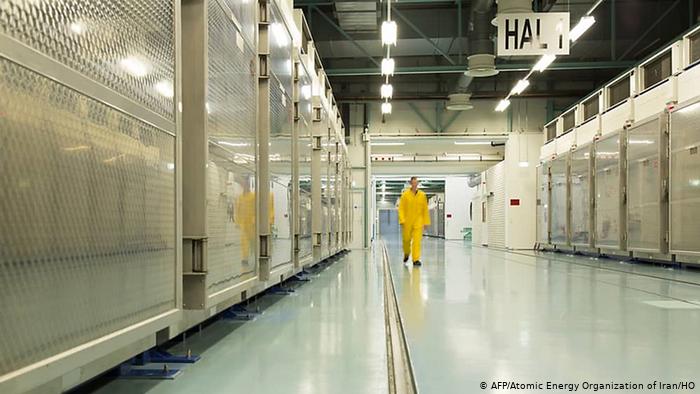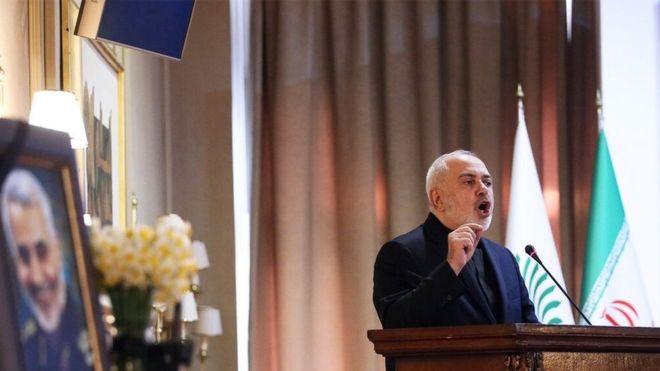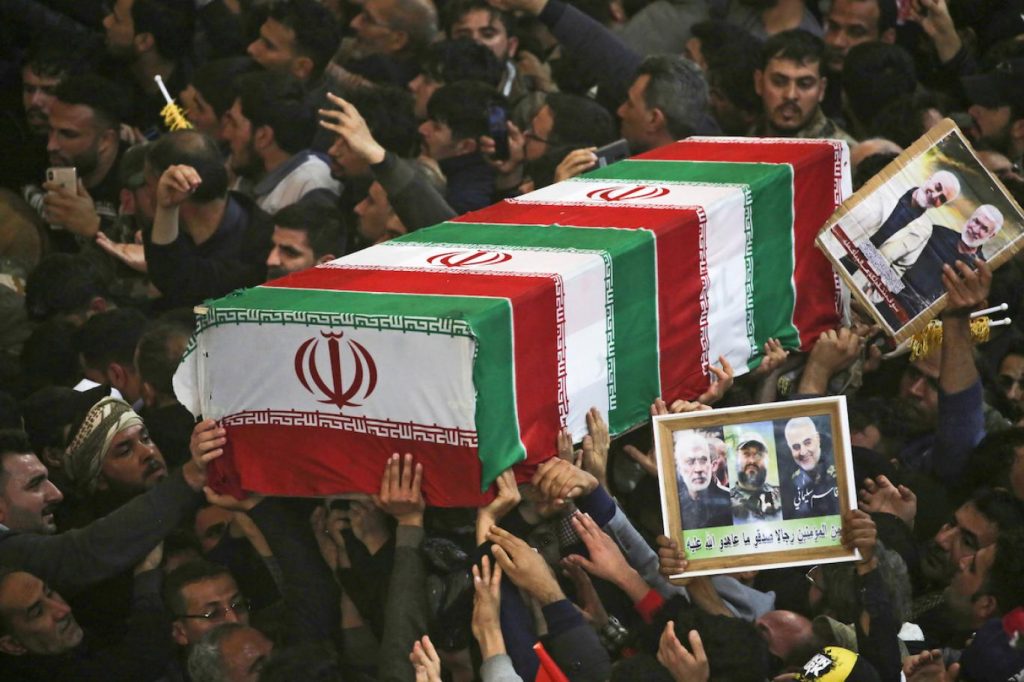
A Step to Put Pressure on America
Etemad’s editorial discusses the pros and cons of the Iraqi Parliament’s bill to oust foreign forces from the country.
The Iraqi Parliament ratified a bill consisting of two parts. In the first part, the Iraqi government is asked to start negotiating for the exit of all foreign forces from Iraq. The second part stresses that only the government and governmental organizations have the right to possess arms, calling for non-governmental organizations to be disarmed.
Of course, both parts of the bill are controversial. There is skepticism as to whether the interim government in Iraq has the capacity to enforce the bill. On the other hand, the question is – will the Americans agree to exit Iraq?
On the other hand, certain groups in Iraq, including the Kurds, are against such a decision, and the Iraqi government has no dominance in Iraqi Kurdistan to enforce it. Therefore, this plan will face many challenges.
This bill, nevertheless, is a decisive step for putting pressure on the Americans. It must be noted that this is not the first time such a measure has been taken. Earlier, the Iraqi government made a decision in this regard which resulted in domestic insurgencies. Moreover, later with the emergence of ISIS, Iraqis called for the return of American forces to their country.
The Iraqi army has its roots in the country’s tribes and can easily fall apart in case of a crisis. So the question is how can the Iraqi government resolve its issues without the US presence, and create security in Kurdish and Sunni regions?
Moreover, if Iraq’s central government is undermined, the position of the Kurds might improve, and they might push for their own independence. That too might create unpredictable scenarios in the region.
Adventurism or Miscalculation?
The editorial of Setareh Sobh focuses on the killing of Qassem Soleimani and its possible fallout for America and Donald Trump.
The US killing of General Soleimani triggered many interpretations, remarks, and views by Iranian and American officials. Iranian Foreign Minister Mohammad Javad Zarif called it ‘rogue adventurism,’ the US warmongering senator, Marco Rubio, considered it as Tehran’s miscalculation and misinterpretation of Washington’s actions.
Now the question is: What is the truth? Was the killing of Soleimani ‘rogue adventurism’ or a miscalculation?
A look at Iran-US strained relations in the framework of recent regional developments indicates that this incident was not because of Tehran’s misinterpretation of Washington’s actions, but was the result of Washington’s miscalculation of Tehran. In fact, with the killing of Soleimani, Washington gave an open hand to Tehran for retaliatory measures and an opportunity to challenge Washington’s interests.
This measure will also help in changing the Quds Force’s mission in places like Damascus, Baghdad, Beirut, and Aden from military consultation to direct presence. Now since the Quds Force can strike Washington with heavy blows in these proxy wars, there is no doubt that with the change in the Quds Force’s mission, we will see more challenges that threaten Washington’s interests in geopolitical and strategic locations.
As such, given the strong position announced by Tehran with regard to the killing of Soleimani, Washington’s interests will be threatened all over the world and particularly in western Asia by Tehran and its allies. This might spark a war between Tehran and Washington, endangering Washington’s interests.
If so, it isn’t impossible for Washington to exit the Middle East and Iraq early. Of course, this is not just because of Tehran’s countermeasures against Washington; some influential groups in Iraq like the Sadrists and Hashd al Shaabi have already asked for Washington to get out of Iraq.
The outcome of such a demand will mostly harm Trump and the Republicans in the upcoming US presidential elections.
Great Revenge
The editorial of Jahan Sanat goes over US justifications and motivations for assassinating IRGC Quds Force commander, Qassem Soleimani, in Baghdad.
The killing of General Soleimani and Abu al Muhandis in Baghdad airport was undertaken by the United States as it was seeking revenge for a rocket attack on its base in Kirkuk which killed an American civilian who was working as a contractor for the US army. As we know, America has transferred many of its military operations in Afghanistan, Iraq and other places to private military companies like Blackwater.
The initial US reaction was to attack three Hashd al Shaabi bases in Iraq and Syria resulting in 25 fatalities. As a result of this extensive operation, the US embassy in Baghdad was sieged and damaged by protesters, but the siege came to an end when Iraqi officials requested the protesters to withdraw.
The Americans seemed to be really worried about the operation carried out by Hashd al Shaabi, with probable cooperation from Soleimani, and they were monitoring his clandestine trips to Iraq. That is why when Soleimani entered Baghdad and was welcomed by Abu al Muhandis, a US drone killed them.
Soleimani’s trip and his meeting with Hashd al Shaabi’s commanders must have been related to their next reaction to the US attack on Hashd al Shaabi’s bases, so it can be concluded that the Americans were really worried about this upcoming joint response.
By designating the IRGC Quds Force and Hashd al Shaabi as terrorist organizations, the Americans think they can freely target the leaders of these groups, particularly given the fact that after defeating ISIS, America does not find it reasonable for these groups to have any influence.
Whatever the excuse may be for this move, America aims to enter the final stage to counter Hashd al Shaabi and the growing influence of the Islamic Republic. One US senator has gone as far to say that in case of any reaction by Iran against US interests, the next target can be Iran’s oil refineries.
Obviously, the Islamic Republic will consider other regional targets, and military operations can exponentially escalate and destroy a large part of the region.
Next Year’s Budget Bill; A Mirror to Iran’s Economy
Servat’s editorial indicates that the problems with the budget bill for next year reflect the issues which exist within Iran’s economic structure.
Every year the government drafts the budget bill in reverse: they first determine the expenses and then define the revenue to provide for the expenses. The numbers announced by the government in the draft budget bill are all predictions, which might not come true.
This issue becomes very important as it puts all budget assumptions under question, particularly now that the country is facing instability in different fields.
The budget deficit is the biggest problem for the budget bill. The budgetary allocations of certain entities and institutions have not only not decreased, but they show an increase in keeping up with inflation. That is why some say that next year’s budget draft is more like wishful thinking.
Each year economists say that the only way to save the country is through selling securities and entrusting public assets to the private sector. But this has created many problems in privatization, because for years, the government has not been able to pay back its debts to contractors on time, and has now lost its credibility.
In next year’s budget bill, it is predicted that the government’s revenue from selling its surplus assets will be 49,500 billion tomans, while this number has been 500 billion tomans in recent years. Since the government’s assets usually include land and big buildings, it is very difficult to find actual buyers for these assets given the country’s volatile political and economic conditions.
Some politicians mistakenly consider the budget as the cause of the country’s economic problems, while the budget mirrors the economic conditions in Iran. Instead of amending the budget, the country’s economic structure must be fixed.

Iran’s Parliament Adds 200 Million Euros to the Quds Force Budget

Iran’s Parliament announced that the IRGC’s Quds Force budget will increase by 200 million euros, while designating all members of the US Department of Defense, as well as its companies and affiliated institutes, as ‘terrorists.’
The Quds Force is the IRGC’s expeditionary branch which was led by Qassem Soleimani for about 23 years until he was killed in an airstrike near Baghdad airport. Currently, Esmail Ghaani who was Soleimani’s deputy for years, is the commander.
The speaker of the Iranian Parliament Ali Larijani, said for the next two months of the Iranian year (starting on March 21), “200 million euros will be taken from the National Development Fund for supporting the IRGC’s Quds Force which is in charge of resistance in the region.” Permission for budgetary allocations has been taken from Iran’s supreme leader.
The money for military activities outside Iran is withdrawn from the National Development Fund which was created with the aim of investing oil and gas revenues to create more sustainable economic wealth for Iran. The fund’s money shouldn’t be spent on other budgets.
Larijani added that after the killing of Soleimani on the direction of the US president, “we designate all members and commanders of the Pentagon and those who ordered and martyred General Soleimani as terrorists.”
Qassem Soleimani had a significant role in the crackdown on protests in Iran and the region and was responsible for the massacre of thousands of civilians.
Radio Farda
Iran International
The Islamic Republic Ends all Commitments Under the Nuclear Deal

Iran announced the fifth and final step in reducing its obligations under the nuclear deal (JCPOA). This took place two days after the killing of Qassem Soleimani. This step can lead to the return of international sanctions against Iran.
The government of the Islamic Republic, in a statement, announced the fifth and last step in reducing its commitments under the JCPOA, stating that it no longer observes any commitments (including enrichment capacity, percentage of uranium enrichment, amount of enriched materials, and research and development). The Islamic Republic has stressed that from now on, Iran’s nuclear program will advance based on its technical requirements.
The final step was announced when tensions between Iran and America unprecedentedly escalated after the killing of Soleimani. Stepping back all commitments stipulated in the JCPOA can only mean more tension with America and other western countries as well as further isolation of Iran.
Iran’s step can activate the ‘trigger mechanism’ in the JCPOA, which means that the international sanctions that existed before the nuclear deal will be reimposed, after referring Iran’s nuclear file to the United Nations.
In reaction to Iran’s announcement, German Chancellor Angela Merkel, French President Emmanuel Macron, and British Prime Minister Boris Johnson issued a joint statement asking Iran to stop taking measures which are against the JCPOA and abide by the nuclear deal. Britain called Iran’s move ‘concerning’, while Germany said it can be the first step towards terminating the nuclear deal.
US President Donald Trump also tweeted in this regard emphasizing that ‘Iran will never have a nuclear weapon!’
The US Administration Denies Zarif a Visa

Iranian Foreign Minister Mohammad Javad Zarif confirmed that America has not issued him a visa for attending the United Nations meeting in New York.
Zarif was supposed to go to the United States to attend the UN Security Council meeting held on the 57th anniversary of the formation of the UN Charter. The Iranian foreign minister has said that the invitation for the meeting was made by Vietnam weeks ago, and his presence in New York has had nothing to do with the killing of Qassem Soleimani.
In the summer of 2019, the United States put sanctions on Mohammad Javad Zarif as he is a person who directly or indirectly works for Ali Khamenei. Nevertheless, back then, after being put on the terrorist list, he did receive a US visa for going to the United Nations.
With regard to being denied a US visa, Zarif said that he wasn’t willing to attend this meeting, but the special meeting of the UN Security Council would be a good opportunity to “raise the issue of American crimes.”
Since the killing of Qassem Soleimani, the IRGC’s Quds Force commander, in a US airstrike, tensions between Iran and America have unprecedentedly heightened.
Iran vows taking revenge with a military response, while the US President Donald Trump has threatened that in case such a thing happens, he will strike 52 targets including historical and cultural sites in Iran.
As for Iran’s reaction to the killing of Soleimani, Ali Shamkhani, the Secretary of the Supreme National Security Council, has said Iran is considering 13 options in response to the US attack.
End of Soleimani and the JCPOA

Qassem Soleimani, in one of his rare statements concerning the nuclear deal (JCPOA), had said that the enemy of the Islamic Republic wants to destroy it by negotiating a second and third JCPOA. Now with the killing of Soleimani, it seems that there is no prospect for any other JCPOA, and even the JCPOA itself can no longer survive.
On Friday morning, Soleimani was killed in a US drone attack against his vehicle close to Baghdad airport. This coincided with Iran deciding to take its fifth step in reducing its obligations under the nuclear deal.
Earlier, it wouldn’t have seemed that Tehran would take any essential step in pulling out of the JCPOA, but now the nuclear deal has the potential of becoming a tool for taking revenge as promised by the Islamic Republic.
The statement issued on Friday by Iran’s Supreme National Security Council asserted that the Islamic Republic vows to take revenge for the killing of one of its top military commanders at the proper time and place.
Since Tehran and Washington do not seem to be after a full-out conventional war, the JCPOA is probably one of the most accessible options for the Islamic Republic to put its power on display – particularly now that public opinion inside Iran is expecting such a move.
Tehran’s officials have unanimously stressed not to ignore the killing of the IRGC’s Quds Force commander. But most international observers hold that the Islamic Republic’s options for harsh retribution without endangering its own existence are very limited.
Under such circumstances, perhaps the JCPOA is the most immediate and the least dangerous option for the Islamic Republic to take revenge. Pulling out of the nuclear deal might lead to enforcing the trigger mechanism in the deal and the return of international sanctions, but it will not increase the risk of US retaliatory measures.
Even if Iran doesn’t officially pull out of the JCPOA, the deal doesn’t have much chance to survive.
With the killing of Soleimani, the JCPOA has come to an end. Soleimani, who considered negotiating with America as ‘humiliating,’ through death has shown that Khamenei’s ‘no war, no negotiation’ strategy cannot last forever.
